When God commands justice, we are to do justice, and the state is to enforce it. When He commands grace, we are to exercise grace. But it is precisely because grace is not justice, and because God ordained the state to enforce justice, that the state is never to enforce grace. Indeed, “forced grace”—the real meaning of Progressive “social justice”—is a contradiction in terms.
—E. Calvin Beisner—
Key point: When injustices occur, the solution is not “equality,” but justice—the kind of justice God prescribes in the Bible. Attempts to apply the solution of “equality” to perceived injustices are injustices in and of themselves.
To access additional Word Foundations articles on social justice, go here.
In part 1 we examined Matthew 18:21-35 and the expectation that those who have experienced God’s forgiveness are compelled to forgive others. Actually, forgiving others is more than an expectation; it is a requirement. But wait! someone will say. Are you saying that if a person claiming to be a Christian refuses to forgive another for offenses committed against him or her, that individual won’t go to heaven? For the answer, I can only turn to the words and the example of Jesus. On three separate occasions Jesus indicated that those God has forgiven must extend forgiveness to others. If they don’t, Jesus said, God will not forgive them. Go here for a brief summary of each of these passages.
Moreover, Jesus was no hypocrite. He practiced everything He taught. As He was dying on the cross, He prayed, “Father, forgive them, for they do not know what they do” (Luke 32:34).

What, then, does forgiveness look like? In part 1 we highlighted the life of Louis Zamperini as an example. Zamperini become a Christian after World War 2. For more than two years, he was held as a prisoner of war in Japan, and he received brutal, inhumane treatment. One guard in particular was especially cruel. Between the time he returned home from the war and his conversion to Christianity, he remained tormented. Yet, after giving his life to Christ, Louis Zamperini found a peace that previously had eluded him. He returned to Japan and offered forgiveness to those who had mistreated him, and he even sought, repeatedly, to meet with his primary adversary so he could extend forgiveness to him as well. There is nothing as liberating as forgiveness—not just for the one forgiven, but also for the one who forgives.
Christians Must Extend Forgiveness to All Offenders, Including Christians

Corrie ten Boom, whose story we have related in a previous post, would join Louis Zamperini in affirming the benefits of forgiveness. She forgave those who had been cruel to her and and her sister at Ravensbruck concentration camp in Germany, as well as others who had mistreated members of her family and even contributed to their deaths.
Could Corrie also forgive fellow Christians for a much smaller offense? Yes, with God’s help, she could and she did. Listen to her testimony in this 2-minute audio clip.1
Part one of our series, therefore, carries this subtitle:
Those Who Are Forgiven Are Compelled to Forgive
I believe this statement accurately represents what the Bible teaches—or at least a portion of what it says and means. We even can make the case that the message of the Bible with regard to believers’ responsibility to forgive others is even a great deal stronger. The the main point is that people God has forgiven forgive others. Jesus and Scripture provide no “wiggle room” for anyone on this issue.
We now are ready to move ahead to part two.
Part Two
Those Who Demand “Social Justice Equality” Are Unforgiving
I want to be very careful here, because in this section, I realize am charging men and women who claim to be Christians (and I am not at all refuting their claims to be brothers and sisters in Christ) with failing to forgive, or failing to have an attitude of forgiveness, when it is their responsibility to do so. Remember the title of this series: “Social Justice and Biblical Christianity Are Incompatible: Here’s Why” (emphasis added).
Further, I am keenly aware that I speak as a white male, and many in the social justice movement, though not all, are people of color. Nevertheless, these elements do not erase other realities that need to be addressed, actions and perspectives that are glaringly inconsistent with the teachings of God’s Word. Nor do my being white and male take away my right to speak. Be assured that I do not make any accusations lightly. I simply have to be honest about the evidence I see before me. In fact, I cannot deny it. I am compelled to point it out. In this post we’ll highlight three specific pieces of evidence. Next time we will cite at least one more.
I need to make one more point and elaborate on it briefly before moving forward. Being opposed to the social justice movement and its recommendations does not mean I am without concern or compassion for the poor, whatever their race.2 Counterfeit “solutions” that initially make us feel good but that worsen our problems must be rejected. True compassion never ignores reality. This is one of the main reasons we are examining the following evidence.
Exhibit 1: What Social Justice Is

We first must remind ourselves of exactly what social justice is, because the nature of social justice itself demands that those deemed to be oppressed will be unforgiving. We have defined social justice before, but we do well to refresh our memories. Dr. Calvin Beisner, who has written an informative booklet on social justice in which he contrasts it to biblical justice, was interviewed by Dr. Frank Wright of D. James Kennedy Ministries. In the following one-minute-fifteen-second clip from the interview, Dr. Beisner explains what social justice is and why we should be wary of it. The first voice you will hear on this clip is that of Dr. Wright.
Therefore, social justice, which has ties to Marxism, “basically means using the coercive power of government to achieve some greater approximation of equality for everybody than whatever we might have—no matter whether you’ve got a society where income inequality is very small, or where income inequality is very great, we’re never satisfied. It’s gotta be a little more equal.”
With this in mind, it’s easy to see why individuals who are members of groups the social justice movement sees as lacking, oppressed, and/or disadvantaged would eye the resources of those in groups considered, because of their “privilege,” to be oppressors. They say they want “justice,” but the SJM instead promotes coveting, envy, theft, division, bitterness, and hatred. It further encourages “oppressed” groups to withhold forgiveness and to demand retribution.
Justice is something altogether different from a manipulation of resources to achieve “equality.” Biblical justice “means ‘rendering impartially and proportionally to everyone his due in accord with the righteous standard of God’s moral law.’ Biblical justice isn’t about equalizing wealth, but about impartiality and making sure people receive what they rightly deserve.”
Social justice, which has ties to Marxism, “basically means using the coercive power of government to achieve some greater approximation of equality for everybody than whatever we might have—no matter whether you’ve got a society where income inequality is very small, or where income inequality is very great, we’re never satisfied. It’s gotta be a little more equal.”
Justice from a biblical perspective “means ‘rendering impartially and proportionally to everyone his due in accord with the righteous standard of God’s moral law.’ Biblical justice isn’t about equalizing wealth, but about impartiality and making sure people receive what they rightly deserve.”
—Dr. Calvin Beisner—
Meet Thabiti Anyabwile

Thabiti Anyabwile, formerly known as Ron Burns, is a pastor at the Anacostia River Church in Washington, DC and a Council member of the Gospel Coalition. He converted to Christianity from Islam, but
he did not abandon the name he took at the time of his earlier conversion to Islam. He explains why:
“For me, it wasn’t as much a Muslim name as a cultural association. Thabiti has its roots in Africa, a Swahili word suggesting, ‘a true man and upright.’ Anyabwile is Arabic and means, ‘God has set me free.’”
A Movement with a Strategy
As we soon will see, Thabiti is a social justice warrior (SJW). We need to be aware that social justice advocates are involved in a movement that has gained a great deal of traction in recent years. Other than the items mentioned in the definition of social justice above, what does this movement seek to do? Christian leader Voddie Baucham understands the cultural forces at work, and in this presentation he names the steps in the social justice movement’s (SJM’s) strategy.
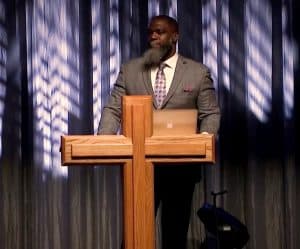
-
-
-
- Identify disadvantaged groups.
- Assess group outcomes.
- Assign blame for disparate outcomes (i.e. if a group is experiencing a negative outcome, the next step is to determine who is to blame). This is a key step in achieving permanent victimhood.
- Finally, [according to the movement,] there needs to be a redistribution of power and resources in order to redress the group’s grievances.
-
-
Baucham [further] offered an important qualifier, which is that [according to SJWs,] the disadvantaged group is never to blame for its own problems — the group is perpetually the victim, always to be believed and sympathized with.
Exhibit 2: Anyabwile Applies the Strategy
In April of 2018, Thabiti Anyabwile wrote an article published titled “We Await Repentance for Assassinating Dr. King.” Note that this article is available on The Gospel Coalition website.
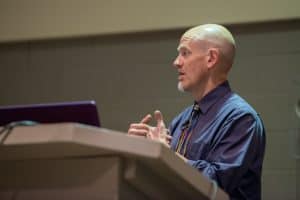
Responding to the article with an article of his own, theologian James White addressed a number of issues Thabiti had raised. White wrote in part,
Thabiti reminded us that MLK was “assassinated, murdered, violently killed,” and that he did not just “die.” As he wrote, “The Civil Rights leaders standing on the balcony on that dark day pointed not only to Ray and the area where the shot was fired, but figuratively pointed to the entire country in its sinister hatred and racism.” He then made the case that the country as a whole is guilty, for he writes, “Until and unless there is repentance of this animus and murderous hatred, the country will remain imprisoned to a seared conscience.” He then adds “the Church” to the list, though he does not chart the path as to exactly how all of this can be processed consistently (since, of course, many in the country were only tangentially aware of, or concerned about, MLK and related matters). But then he added this short paragraph, which garnered a great deal of attention:
My white neighbors and Christian brethren can start by at least saying their parents and grandparents and this country are complicit in murdering a man who only preached love and justice.
My white neighbors and Christian brethren can start by at least saying their parents and grandparents and this country are complicit in murdering a man who only preached love and justice.
—Thabiti Anyabwile—
White continued,

I am not the only one to point out that the complex knot of associations, groups, and individuals, thrown into this single sentence is next to impossible to disentangle. When you say someone was complicit in murder, you should have a very clear and identifiable mechanism of establishing said guilt, and given the broad net he throws, the assertion itself provides more than sufficient self-refutation.
James White is right. So is Voddie Baucham. We see in Anyabwile’s statement an attempt to blame a group (and effectively all the individuals in that group), not solely the individual who was directly responsible, for Dr. King’s death. This is not to say that racism wasn’t present in the culture that prevailed in 1968, nor is it to excuse any racism of the past, or any that is rearing its ugly head today. It is to echo Dr. White’s concern that Thabiti’s accusation is more than misleading. It is false.
We are not saying that racism wasn’t present in the culture that prevailed in 1968, nor are we excusing any racism of the past, or any that is rearing its ugly head today. We are echoing Dr. White’s concern that Thabiti’s accusation is more than misleading. It is false.
Thabiti’s accusation gives him an advantage in the discussion anyway. It is emotionally charged. It sets the stage for one group to feel it has been victimized and for another to feel guilty for being a party to oppression. And significantly, it also sets the stage for Thabiti and other SJWs to make demands of the group they have accused of being the oppressors.
Exhibit 3: Further Application of the SJM’s Strategy—the Demand for Reparations for Slavery in the United States
Thabiti Anyabwile isn’t content to blame whites and their racism for Dr. Martin Luther King’s death, as serious as this accusation is. No. He wants reparations for slavery, and he refutes the notion that reparations paid to blacks by the government would involve government redistribution of wealth. He makes these assertions even though it is glaringly obvious that no one who owned slaves in America is still alive and that no one who was a slave remains alive, either. Remember Dr. Voddie Baucham’s points. The SJM is set on establishing groups made up of victims and groups made up of oppressors. With a particular group at fault, that group can be punished for wrongs it supposedly committed—and the wrongs for which its ancestors are “guilty.”
Never mind that not every white southerner was a slaveowner. Never mind that some southerners fought in the Union Army. Never mind that certain black families arrived in the United States after the Civil War. Never mind that one of the wealthiest slaveholders in South Carolina was black. And yes, other free blacks who owned slaves existed as well. Further, never mind that blacks are among the recipients of various welfare programs already in place. In this video, podcaster and historian Jon Harris does a great job describing just how complicated arriving at a formula for reparations would be.
None of this seems to matter to Thabiti Anyabwile. Read some of his recent tweets on the subject of reparations and the exchanges associated with them.
On April 3, Thabiti @ThabitiAnyabwil tweeted. “Restitution is not theft.” Apparently this was his attempt to address the objection raised by opponents of reparations who point out the practice would involve government theft. Remember, the social justice movement advocates redistribution of resources to achieve some semblance of equality, often to right the wrongs, or the perceived wrongs, of the past or present. In this context, you cannot have redistribution of wealth without government’s taking—stealing—the resources of those who have (thereby violating their right to private property), and giving those resources to others who have been deemed to be oppressed in some way. Stealing and coveting are violations of the Eighth and Tenth Commandments, respectively.
Pastor John Carpenter @JohnCarpenter64 replied, “True. But taking from people who didn’t do an injustice because of what their ancestors did and giving to people who didn’t suffer the injustice because their ancestors did is not restitution.”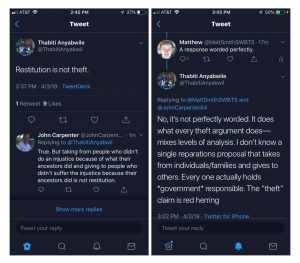
Matthew @MattSmithSWBTS praised Carpenter. He tweeted to both Carpenter and Anyabwile, “A response perfectly worded.”
Thabiti @Thabiti Anyabwil pushed back, “No, it’s not perfectly worded. It does what every theft argument does—mixes levels of analysis. I don’t know a single reparations proposal that takes from individuals/families and gives to others. Every one actually holds *government* responsible. The ‘theft’ claim is red herring”
The discussion progressed further, with two others joining in, challenging Anyabwile. Thabiti @Thabiti Anyabwil then tweeted, “Give to Caesar what is Caesar’s. And if Caesar chooses to make restitution with what is his, then he has that authority. 2nd, it’s not a redistribution based on race but based on injustice. 3rd, no one is asking the state to reform the church. That’s a misrepresentation.”
Later, John Carpenter @JohnCarpenter64 tweeted this reply. “Caesar has a right to tax to pay for legitimate expenses. Taxing some people because of what their ancestors did to give to others because of what their ancestors suffered isn’t ‘restitution’ or just. Calling that ‘restitution’ 1984-like double-speak, propaganda.”
Thabiti Has a Lot of Company
It should be no surprise that Thabiti Anyabwile isn’t alone. You may remember a Twitter exchange we highlighted a few weeks ago between Pastor Duke Kwon and Jacob Brunton. Here is that exchange. Pastor Kwon @dukekwondc tweeted, “When people hear ‘reparations’ many retort ‘forgiveness is better’ which is also what some say to victims of abuse ‘no, forgive’ but forgiveness and justice are not at odds what I release as a cross-bearer what I’m owed as an image-bearer alas, racial oppression is abuse
Jacob Brunton @JacobTBrunton replied, “I’m all for reparations… from actual oppressors to their actual victims. Can you point any of them out? If not, then it’s not ‘justice’ you’re talking about, and you should take care to stop using that word. (Isaiah 5:20)”
Unfortunately, Anyabwile’s and Kwon’s perspective represents the viewpoint of a growing number of evangelical leaders, whites and blacks alike. As we will see, this isn’t about reparations only, but about a broader agenda—a political one.
We’ll reserve that evidence for next time. For now, consider how bitter and unforgiving the quest for social justice makes an individual who is a member of an allegedly victimized group. And the social justice narrative intensifies resentment by telling these “victims” their “oppressors” have basked in their own “privilege.”
Social Justice Equality Is Antithetical to the Biblical Command to Forgive
In America, great strides have been made with regard to the issue of racism. This is true in the church as well. For example, in 1995, the Southern Baptist Convention officially apologized for the racism in its past, as well as for slavery.
Keep in mind two things with regard to the church on the issue of race.
First, the fact that churches are not fully integrated on Sunday morning isn’t necessarily a sign of racism. In an Open Letter to Russell Moore, president of the Southern Baptist Convention’s Ethics and Religious Liberty Commission and a social justice warrior, Lorine Spratt, a black Southern Baptist, writes,

I, and many other Black congregants, attend a predominately White, Southern Baptist Evangelical Church. We attend there because we are free to do so, we’ve been welcomed, and we’re seen and treated as brothers and sisters in Christ. I truly believe that I could attend any White Evangelical church and be welcomed. However, there are born again Black believers who choose to attend Black evangelical churches and worship within their culture and they are free to do so. We are exercising our freedom to choose. We are not commodities to be bargained with or exploited or used to promote an agenda or boost quotas.
We are not commodities to be bargained with or exploited or used to promote an agenda or boost quotas.
—Lorine Spratt, a black Southern Baptist, speaking of herself and other Christians in the black community—
Second, many current racial tensions in the church are being ignited and exacerbated by the current social justice movement that has infiltrated churches and denominations.
In a second open letter, this one to SBC leaders, Spratt says this:
As a born-again, conservative, black worshiper, who attends a predominately White Southern Baptist Church, it’s disturbing to hear a very biased narrative, especially from leaders who have the potential to influence the masses.…
Please allow me to share why from my personal experience. I grew up during the latter part of the desegregation era. I saw the “Colored” signs that hadn’t come down yet and I was a little girl when my mother delivered 4 of her 6 children at a “white hospital” and could not have a bed in the same maternity ward as the “white mothers”. Also, in 1975 while at work, I experienced public verbal prejudice for the first time in my life. Now, by the voice of Dr. Moore and his cohorts, I should demand an apology for the treatment I received but I say, “No apology necessary!” There’s no need for anyone today to apologize to me for something their forefathers did 43 years ago. More importantly, the Holy Spirit has shed His love abroad in my heart and I hold no one hostage for an apology. Numerous sincere, repentant apologies and resolutions have been made. Those apologies and resolutions have been accepted and we should continue to move forward and press on together seeing people as people – not color – being fully devoted to sharing the gospel with every people group, and every nation until our Lord returns.
Lorine Spratt’s perspective simply is biblical. She is offering love, and she is receiving it. Recall what the apostle Paul wrote to the Christians in Corinth—and also to us—about love.
4 Love suffers long and is kind; love does not envy; love does not parade itself, is not puffed up; 5 does not behave rudely, does not seek its own, is not provoked, thinks no evil; 6 does not rejoice in iniquity, but rejoices in the truth; 7 bears all things, believes all things, hopes all things, endures all things.
Remember as well that Paul also wrote this to the Colossian believers in Colossians 3:8-17:
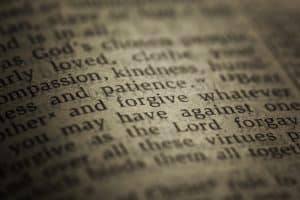
8 But now you yourselves are to put off all these: anger, wrath, malice, blasphemy, filthy language out of your mouth. 9 Do not lie to one another, since you have put off the old man with his deeds, 10 and have put on the new man who is renewed in knowledge according to the image of Him who created him, 11 where there is neither Greek nor Jew, circumcised nor uncircumcised, barbarian, Scythian, slave nor free, but Christ is all and in all.
12 Therefore, as the elect of God, holy and beloved, put on tender mercies, kindness, humility, meekness, longsuffering; 13 bearing with one another, and forgiving one another, if anyone has a complaint against another; even as Christ forgave you, so you also must do. 14 But above all these things put on love, which is the bond of perfection. 15 And let the peace of God rule in your hearts, to which also you were called in one body; and be thankful. 16 Let the word of Christ dwell in you richly in all wisdom, teaching and admonishing one another in psalms and hymns and spiritual songs, singing with grace in your hearts to the Lord. 17 And whatever you do in word or deed, do all in the name of the Lord Jesus, giving thanks to God the Father through Him.
What does it mean to forgive? Dr. Charles Stanley observes that
Forgiveness is “the act of setting someone free from an obligation resulting from a wrong done against you.” For example, a debt is forgiven when you free the offender of his responsibility to pay back what he owes you. True forgiveness, then, involves three elements, all of which are necessary: an injury, a debt resulting from the injury, and a cancellation of the debt.
Why do I say that “Social Justice and Biblical Christianity Are Incompatible”? Social justice leaves no room for forgiveness; rather, it demands retribution, for real or perceived wrongs—or for both. It breeds envy and hatred. It divides.
Moreover, not only does social justice stifle forgiveness, it also exacerbates guilt and offers “offenders” no ultimate relief.
It therefore is contrary to the Spirit of Christ and the teaching of the New Testament.
It is incompatible with biblical Christianity.
Part 3 is available here.
To access additional Word Foundations articles on social justice, go here.
Copyright © 2019 by B. Nathaniel Sullivan. All rights reserved.
Unless otherwise indicated, Scripture has been taken from the New King James Version®. Copyright © 1982 by Thomas Nelson, Inc. Used by permission. All rights reserved.
Note:
1A presentation given by Corrie ten Boom was featured on Dr. James Dobson’s Family talk on September 28 and 29, 2016. The clip featured here comes from part 2 of the broadcast series.
2As we highlight in this article, the social justice movement (SJM) says blacks, in particular, have been held back because of racism and that they should be compensated for the “oppression” they’ve faced. Without question, major problems exist in the black community, and a person would have to have a stone-cold heart not to be concerned. The non-maritial birth rate among blacks in America is 70 percent, well above the national non-marital birth rate of 40 percent. Fatherlessness is rampant. Moreover, “93 percent of black homocide victims are killed by other blacks.” Additionally, the violent crime rate for blacks is 7 to 10 times greater than the violent crime rate for whites.
Do we really think that making payments to blacks for having endured what is believed to be systemic racism and oppression will fix these kinds of problems? Poverty actually had been declining until President Johnson launched his “war” against it. Social researcher and poverty expert Robert Rector writes,
For a decade and a half before the War on Poverty began, self-sufficiency in American (sic) improved dramatically. But for the last 45 years, there has been no improvement at all. Many groups are less capable of self-support today than when Johnson’s war started.
The culprit is, in part, the welfare system itself, which discourages work and penalizes marriage. When the War on Poverty began, 7 percent of American children were born outside marriage. Today the number is 41 percent. The collapse of marriage is the main cause of child poverty today.
Economist Walter E. Williams, who is black, puts it this way: “The undeniable truth is that neither slavery nor Jim Crow nor the harshest racism has decimated the black family the way the welfare state has.”
top photo credit: Photo by Jon Tyson on Unsplash
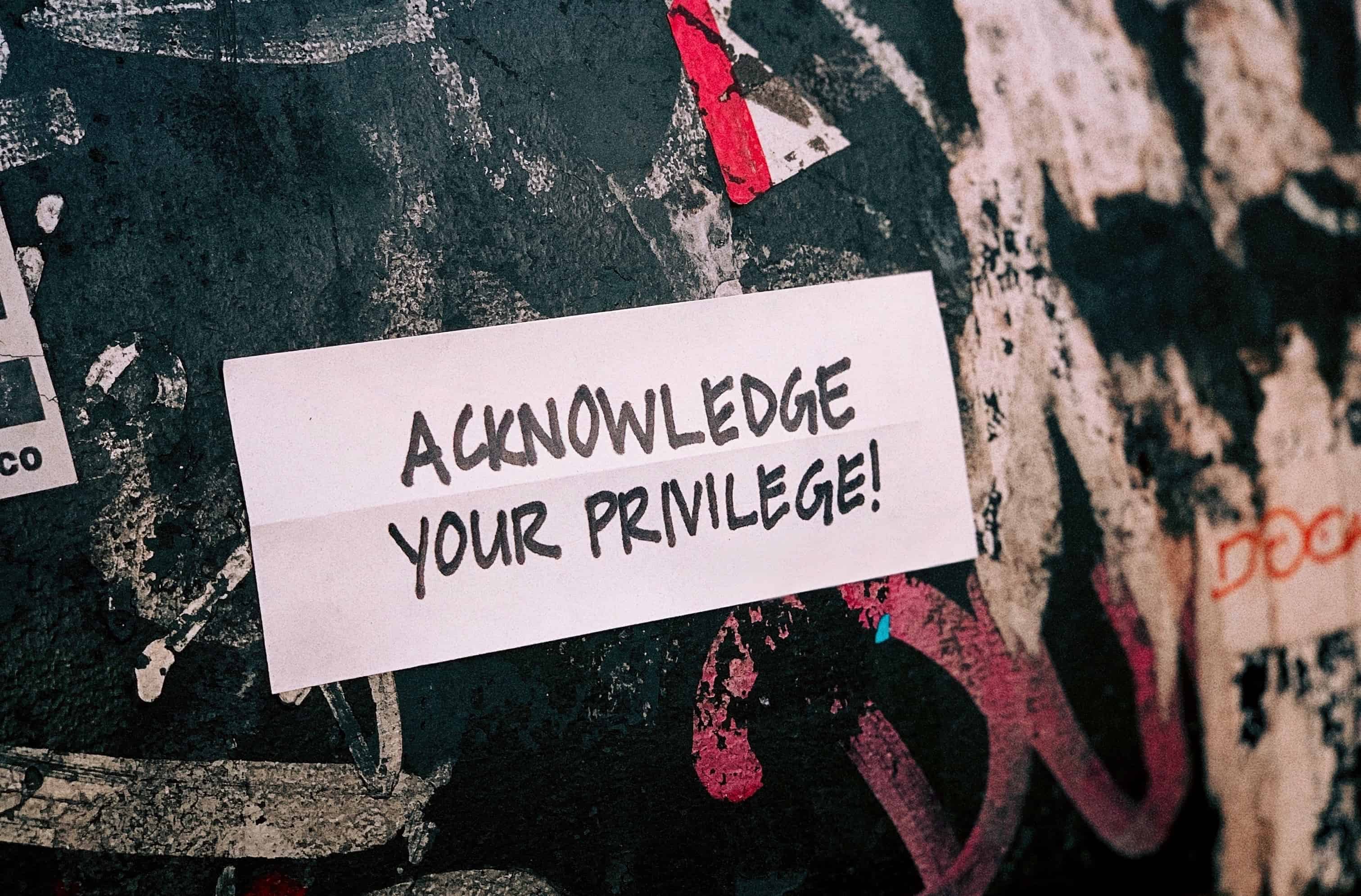
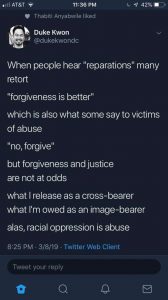
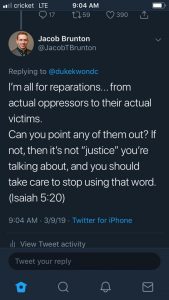
Forgiveness may not come easy in some circumstances, but we still have the obligation to forgive others as Christ demanded. If we do this, God will bless us in return.